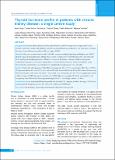Please use this identifier to cite or link to this item:
https://hdl.handle.net/20.500.14356/1688Full metadata record
| DC Field | Value | Language |
|---|---|---|
| dc.contributor.author | Singh, Samir | - |
| dc.contributor.author | Verma, Aman | - |
| dc.contributor.author | Aryal, Gopi | - |
| dc.contributor.author | Thapa, Santosh | - |
| dc.contributor.author | Khakurel, Sudha | - |
| dc.contributor.author | Shrestha, Kalpana | - |
| dc.date.accessioned | 2023-05-18T09:55:38Z | - |
| dc.date.available | 2023-05-18T09:55:38Z | - |
| dc.date.issued | 2016 | - |
| dc.identifier.citation | SinghS., VermaA., AryalG., ThapaS., KhakurelS., & ShresthaK. (2017). Thyroid hormone profile in patients with chronic kidney disease: a single centre study. Journal of Nepal Health Research Council, 14(3). https://doi.org/10.33314/jnhrc.v14i3.877 | en_US |
| dc.identifier.issn | Print ISSN: 1727-5482; Online ISSN: 1999-6217 | - |
| dc.identifier.uri | http://103.69.126.140:8080/handle/20.500.14356/1688 | - |
| dc.description | Original Article | en_US |
| dc.description.abstract | Abstract Background: Chronic kidney disease (CKD) is a global burden and now recognized as a major public health problem worldwide. Patients with CKD have alteration in thyroid hormone metabolism. This study aims to evaluate the status of thyroid hormone profile in different stages of CKD. Methods: The cross-sectional study included 103 CKD patients attending Nephrology and Dialysis unit of KIST Medical College Teaching Hospital, Lalitpur, Nepal. Serum creatinine, free triiodothyronine (fT3), free thyroxine (fT4), and thyroid stimulating hormone (TSH) were measured. Risk factors, duration of illness and physical examination of patients were recorded along with their written informed consent. Patients with history of any thyroid function abnormalities, on medication for hypothyroidism and pregnancy were excluded. Results: Out of 103 CKD patients, 59 (57.28%) were males and 44 (42.71%) were females. Thirty five (33.98%) CKD patients had low fT3 and 19 (18.44%) had low fT4 with normal TSH. Six (5.82%) CKD patients had increased TSH concentrations with normal fT3 and fT4. The median value of creatinine, fT3 and fT4 were significantly altered at different stages of CKD. Among the risk factors for CKD, diabetic nephropathy (44.66%) was found to be the lead primary cause followed by chronic glomerulonephritis (26.21%) and hypertension (23.30%). Conclusions: In our study thyroid hormone profile was altered in CKD patients, mainly in the stage 5 CKD. Most common thyroid dysfunction was low fT3 and low fT4 with normal TSH levels. Keywords: Chronic kidney disease; Thyroid dysfunction; Thyroid hormone profile | en_US |
| dc.language.iso | en | en_US |
| dc.publisher | Nepal Health Research Council | en_US |
| dc.relation.ispartofseries | Sep-Dec, 2016;877 | - |
| dc.subject | Chronic kidney disease | en_US |
| dc.subject | Thyroid dysfunction | en_US |
| dc.subject | Thyroid hormone profile | en_US |
| dc.title | Thyroid hormone profile in patients with chronic kidney disease: a single centre study | en_US |
| dc.type | Journal Article | en_US |
| local.journal.category | Original Article | - |
| Appears in Collections: | Vol. 14 No. 3 Issue 34 Sep-Dec 2016 | |
Files in This Item:
| File | Description | Size | Format | |
|---|---|---|---|---|
| 877-Article Text-1652-2-10-20170528.pdf | Fulltext Download | 167.5 kB | Adobe PDF |  View/Open |
Items in DSpace are protected by copyright, with all rights reserved, unless otherwise indicated.
